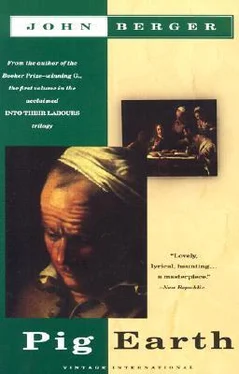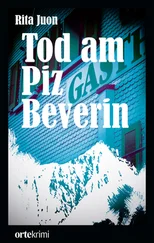In the darkness the room smelt of sacks and earth. A car came up the road and its headlights shone straight through the window at which she stood, lighting up the entire room. In this light, the room looked more than ever like a store shed. In the corner, on the far side of the stove, was a ladder and above it an open trapdoor. When the car had passed, the darkness by contrast was total. The noise of the engine died away. In the silence and darkness, the two of us could as well have been in our coffins.
Do you want to eat some soup with me?
I have a bottle of wine.
So you thought you’d stay!
No, I bought it for myself at home.
After forty years’ absence, what have you got to show? One litre of wine!
A little more.
What?
Enough to live on till I move to the Boulevard of the Laid Out.
So you’ve come back to die.
We’re not young any more.
I’m not ready to die yet, she proclaimed.
Death doesn’t ask if you are ready.
Are you going to live well? she asked.
I’m not rich. I didn’t make the fortune I dreamt of. I was unlucky. Do you always sit in the dark?
What did you find in South America — electricity? I go to bed when I can’t see. You’re going to keep your mother’s house in the village?
I bought it from my brothers.
When did you do that?
This interrogation, during which we were both invisible to the other, reminded me of kneeling before the confession box. I sent them money when I had it.
She must have read my thoughts, for the next question she asked was: Were you faithful to your wife?
What a man does with his own skin, I said, is his own business.
For twenty years I haven’t spoken to anyone after nightfall except my chickens and the goat, when I still had one.
Give me my haversack and I’ll be going.
No, wait! I’ll light the lamp.
She struck a match and made her way over to the cupboard, in which she found a candle.
Are you hot now? she asked the soup, lifting the lid of the saucepan with as much caution as she had first opened the door to me. I can’t grow a single potato for you, they’ve taken every one. Can you lift the lamp down? Otherwise I have to stand on a chair.
The lamp was on the mantelpiece. I lit it. She climbed up the ladder to the loft and came down with a second chair. From the nail in the wall behind the stove she took a pewter ladle and rubbed it against the side of her black dress.
At last we sat down on either side of the table. The soup was steaming in the plates. It must have been past midnight.
So you have brought nothing back with you! She looked into my face.
Not a great fortune.
That’s obvious.
She held out her glass for me to fill with wine.
I swore to survive and become rich, and rich I’ve become, she said. There’s no man on earth who has the right to a single glass of vin blanc paid for out of my money! From now on I’m going to drink wine in the evenings.
What time do you get up in the mornings? I asked. I must be going.
In time to milk.
You have no cows.
I get up in time to milk. Every morning for the twenty years since I’ve been here.
At five?
She nodded.
You have an alarm clock?
In here. She pointed at her white hair.
And tomorrow? I asked.
Tonight is an exception, she said, holding out her glass for me to refill. Tonight I’m going to tell you about the twenty years.
What have they to do with me?
You have come back a pauper yet at least you have seen the world.
When she swore at the feet of the Madonna to survive, she had no clear idea of how to become rich. She knew less than I did when I took the boat to Buenos Aires. All she knew was that she could not become rich in the village.
I have renamed the village, she said. I have renamed it Chez Cocadrille ! She shook with laughter and licked her colourless lips with her pink tongue.
Fifty kilometres away, just over the frontier, was the city of B.… Marius à Brine had spoken of its wealth, just as his father had done. Marius also said that those who lived in B … gave nothing away; they were so mean that they melted the snow to give what was left as alms to the poor! The Cocadrille concluded as she watched her two lost parents embracing that the place where money truly existed was B.… Such money as reached the village was vagrant money. She had to go to its home, where money bred.
What could she take to sell in B …? It was the moment for killing kids and she had no goats. It was the time when last summer’s cheeses were ready to eat, and she had no cows. It was the laying season for chickens and she had not yet built her chicken-run. The solution, obvious as it was, did not come to her immediately. She walked back along the moonlit road from the Madonna’s column.
I slept down here the first night, she said. It took me a year to move up to the loft. I missed the animals in the stable, and the idea of sleeping half-way up the sky, in the cold, didn’t appeal to me. I prefer to sleep on the ground, don’t you?
For a while I lived on the eighteenth storey.
What did it bring you?
She rubbed index finger against thumb in the banknote gesture which signifies money. Then she touched the back of my hand with her fingers.
During the first night in the roadmender’s house, she dreamt of the Madonna. The Madonna spoke to her in her dream and told her that everything which people go out to pick, she must pick first and take to the city. This is why the Madonna’s hands were open and pointing to the grass on the verge of the road.
Next day she took the path up to the highest fields of the village. The altitude there is nine hundred metres, and the grass was only just beginning to grow. She picked dandelions for salad, their leaves still very small, their stalks white. She didn’t come down until she had picked two kilos. Then she set out for the fields and orchards five hundred metres below, and there, where the dandelions were already flowering and the grass as high as her shins, she hunted for morels. Her fingers led her to them, under the pear trees, among nettles, between the stones of walls.
I still know where a mushroom is waiting, like a bitch on heat for a dog.
By the end of the day she had filled a basket.
At dusk she went out once again to collect violets and primroses at the edge of the forest. The violets she arranged in tiny bouquets with a damp cloth around them, and the primroses she cut out of the earth with their roots and soil attached. When it was fully night, she walked along the road to the Madonna’s column and, in the grass at its base, she planted some of the primroses.
A train went to the frontier town which adjoins B.… There was even a song about this train which La Mélanie used to sing. The train in the song left the town at noon, and travelled so slowly and stopped so often by the river, the smoke from the engine going straight up into the sky, that it never reached the village till it was dark, a fact which delighted lovers because they could caress each other undisturbed in the warm upholstered carriages. La Mélanie used to mime their embraces whilst she sang. The Cocadrille took this train. It was going in the opposite direction to the train in the song and went much faster. The journey lasted less than two hours. What frightened her was its smoothness. She was used to lurches and bumps against which, without thinking, she tensed herself so as not to be bruised against the wood of the cart drawn by the horse. The smoothness of the train made her feel sick: it was as if the earth no longer existed.
When the train arrived at the end of the line, she followed everyone out of the station. She saw no one she knew to ask where the frontier was. She resolved to walk in the same direction as most of the men. It was still early in the morning and she knew that many men went to work for the day in B.…
Читать дальше












